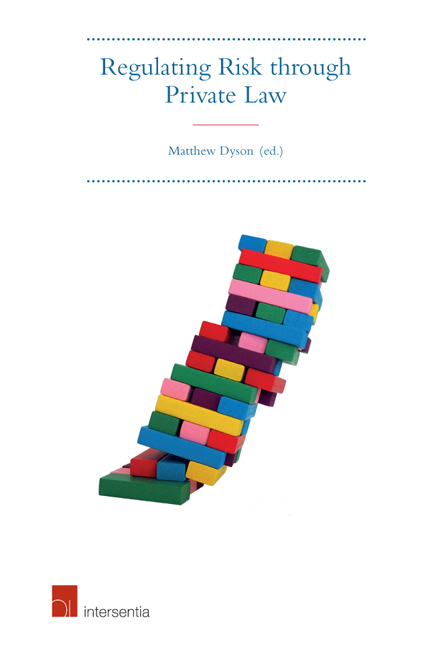Book contents
- Frontmatter
- Preface
- Contents
- Table of Cases
- List of Contributors
- Chapter 1 Introduction
- Part I Risk Overviews
- Part II State of the national art on risk
- Chapter 11 Legal Risk in International Commercial Disputes
- Chapter 12 Medical Accidents and Pharmaceutical Product Liability in France
- Chapter 13 Bearing and Sharing Risk in the Swedish Welfare State
- Chapter 14 Modernisation and Risk Regulation in the Italian Food Sector
- Chapter 15 Motor Vehicle Accidents Caused by Game Wandering onto Spanish Roads
- Chapter 16 Dutch Tort Law at the Crossroads: Judicial Regulation of Health and Environmental Risks
- Chapter 17 Sub Terra: Risk in the Chilean Mining Industry
- Chapter 18 Constitutionalising Rights and Reacting to Risk in South Africa
- Chapter 19 Regulating Risk in Brazil: Resort to General Clauses
- Chapter 20 What does Risk-Reasoning do in Tort Law?
- Chapter 21 Epilogue: What does Risk-Reasoning Tell Us about Tort Law?
- Index
- About the Editor
Chapter 17 - Sub Terra: Risk in the Chilean Mining Industry
from Part II - State of the national art on risk
Published online by Cambridge University Press: 13 October 2018
- Frontmatter
- Preface
- Contents
- Table of Cases
- List of Contributors
- Chapter 1 Introduction
- Part I Risk Overviews
- Part II State of the national art on risk
- Chapter 11 Legal Risk in International Commercial Disputes
- Chapter 12 Medical Accidents and Pharmaceutical Product Liability in France
- Chapter 13 Bearing and Sharing Risk in the Swedish Welfare State
- Chapter 14 Modernisation and Risk Regulation in the Italian Food Sector
- Chapter 15 Motor Vehicle Accidents Caused by Game Wandering onto Spanish Roads
- Chapter 16 Dutch Tort Law at the Crossroads: Judicial Regulation of Health and Environmental Risks
- Chapter 17 Sub Terra: Risk in the Chilean Mining Industry
- Chapter 18 Constitutionalising Rights and Reacting to Risk in South Africa
- Chapter 19 Regulating Risk in Brazil: Resort to General Clauses
- Chapter 20 What does Risk-Reasoning do in Tort Law?
- Chapter 21 Epilogue: What does Risk-Reasoning Tell Us about Tort Law?
- Index
- About the Editor
Summary
INTRODUCTION
Chile is usually recognised as a mining country, the development of this old and established industry being one of the most important sources of work and economic development. From a legal perspective, the importance of this industry has even resulted in a constitutional clause guaranteeing the protection of property over mining concessions. The main regulation devoted to the exploitation of minerals is the current Mining Code. Despite the risks involved in mining, none of the Mining Code's provisions refer to the concept of risk, nor does it set out a coherent treatment of risk. However, several other sources – such as complementary or general statutes, administrative, labour and environmental regulations, and case law – flesh out how risk is treated in the mining industry.
Mining is certainly a very attractive case study, as multiple key aspects of risk are inherent in this activity. The importance of risk is recognised from start to finish, before mines start their activity, during their operating life, and long after mine sites are closed. The risks involved can be classified by looking prospectively at the subject or object which is damaged as a result of the realisation of the risks arising – thus showing the lack or failure of preventive measures – from the mining activity, namely the environment, private property, and the life and health of miners, as well as the surrounding community. Moreover, mining is a particularly useful economic sector to examine from a risk perspective for two further reasons. First, it is pervaded by a relentless tension between socio-political and legal forces. The struggle between these forces can be seen in parliament, the administrative authorities, courts, trade unions, employers, the environment itself, and the community at large. Secondly, mining provides a neat illustration of the interaction between preventive measures and ex post remedies throughout the different stages of a given operation. In particular, extracontractual liability for harms ensuing from risks wrongfully and/or inefficiently dealt with stands out amongst a number of ex post responses provided by the Chilean legal system.
As will be explained, the goal of minimising the risks involved in the development of mining activities is established in legal and administrative regulations of several kinds.
- Type
- Chapter
- Information
- Regulating Risk through Private Law , pp. 399 - 418Publisher: IntersentiaPrint publication year: 2018



